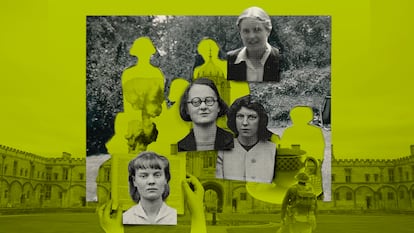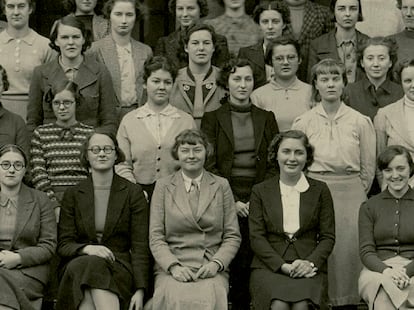The Oxford Quartet: Women who brought philosophy back to life
80 years ago, four thinkers refused to teach classes in skirts and challenged academic orthodoxy between clandestine parties and cigarettes

The mere mention of the University of Oxford evokes a sense of reverence, almost a mystical aura. It is an oasis of tranquility that has witnessed fervent philosophical debates. It’s a place that, in the mid-20th century, served as a haven for a group of dissenting intellectuals striving to rescue philosophy from the confines of orthodox analysis and anchor it firmly in reality.
The so-called Oxford Quartet — Elizabeth Anscombe, Mary Midgley, Iris Murdoch and Philippa Foot — are the subjects of several recent books. We have A Terribly Serious Adventure by Nikhil Krishnan (2023); The Women Are Up to Something (2023) by Benjamin J. B. Lipscomb; and Metaphysical Animals: How Four Women Brought Philosophy Back to Life (2022) by Clare Mac Cumhaill and Rachael Wiseman.
Anscombe, Midgley, Murdoch, and Foot hailed from diverse backgrounds, yet they shared remarkable commonalities. Born between 1919 and 1920, these four women were educated at Oxford during the tumultuous World War II period. In their own distinctive ways, they forged an alliance, united by their rebellion against the limitations of analytical thinking in comprehending the complexities of the world. The prevailing Oxford school of analytical philosophy propagated the notion that moral truths were non-existent and that science held all the answers. However, these trailblazers refused to conform to Oxford’s academic orthodoxy. It was no small feat to challenge the Oxonian positivist philosophy that erroneously conflated theory and analytical tools with the realities of an existence plagued by the grim specters of war, the atomic bomb, and the Holocaust.
The rediscovery of empathy
Inspired by influential educators like Eduard Fraenkel and Donald MacKinnon, the four friends immersed themselves in literature, reveling in clandestine parties fueled by cigarettes, whiskey, tea and biscuits. Amid spirited debates on ethics, evil and love, they were confronted with the haunting images of Nazi death camps. This profound encounter forever altered their philosophical outlook. Confronted by an unequivocal, radical cruelty, they sought to salvage the essence of a shared moral code, rediscovering the values of empathy, generosity, trust, cooperation and creativity in human endeavors. This transformative journey is eloquently captured in an exchange of letters between Wiseman and Mac Cumhaill.
In the realm of analytical systems, moral affirmations were regarded not as true or false, but rather as subjective expressions of the individuals who voiced them. However, these four philosophers saw certain actions as transcending mere opinion. “If morality was not objective,” said Lipscomb, the author of The Women Are Up to Something, “how could we adequately address the atrocities of the Holocaust?” Lipscomb believes that the Oxford Quartet’s most significant contribution lay in revitalizing moral philosophy as a field of study.

Iris Murdoch, an Oxford professor and avid reader of Plato, Sartre and Simone Weil, cautioned that the ongoing discourse surrounding the essence of goodness and human reality would persist, irrespective of whether they fell under the realm of philosophy. Murdoch, who passed away in in Oxfordshire in 1999, wrote about the vulnerability of “doing good,” which she regarded as a skill acquired through moral deliberation and willpower.
In the aftermath of the war, she participated in United Nations programs to aid displaced people in Austria and Belgium. Witnessing shattered lives devoid of hope, she recognized the pressing need for an impactful philosophy. Her conviction: equipping individuals grappling with distinct social and emotional challenges, people who “went to the movies, made love and fought with or against Hitler.”
In essays and novels like The Sea, The Sea, Murdoch passionately championed the pursuit of knowledge through life experience. Her works portrayed lives enriched with inquiries, reflections, and imaginative tales. Recognizing the emergence of a new society driven by science and technology, she understood the imperative for a metaphysical and moral compass. Fascinated by the concept of attachment, she contended that love embodies the essence of art and morality — a profound gesture of embracing individuals as they are, unencumbered by illusions. An intellectual with an insatiable curiosity, her writings provoke contemplation on the ethical choices we encounter in our everyday lives.
The decisions we make, or choose not to make
Murdoch and Philippa Foot were not only close friends but also flatmates, even sharing a boyfriend. Unfortunately, Foot’s passion for philosophy was never well-received by her affluent family, who seemed to console themselves by underestimating her intelligence. However, she remained resolute in her choices. After working as the vice dean at Oxford, she went on to teach at various prestigious universities in the United States until her death in 2010. Among her notable works, Virtues and Vices and Other Essays in Moral Philosophy stands out, in which she contemplated the distinction between actively “doing” something and merely “allowing it to happen.”
One of her most famous ethical dilemmas involved a runaway trolley barreling down the railway tracks. Ahead, on the tracks, there are five people tied up and unable to move. The trolley is headed straight for them. You are standing some distance off in the train yard, next to a lever. If you pull this lever, the trolley will switch to a different track. However, you notice that there is one person on the other track. You have two (and only two) options: do nothing, in which case the trolley will kill the five people on the main track. Or pull the lever, diverting the trolley onto the side track where it will kill one person. Which is the more ethical option? Or, more simply: What is the right thing to do? Foot was an early proponent of moral realism, asserting that true moral propositions exist and values cannot be wholly divorced from facts.
Occasionally, Foot would rendezvous with her friend Elizabeth Anscombe at Oxford’s Socratic Club, a charming, wallpapered Victorian space for genteel debate. But the two friends had no interest in engaging in laborious dialectical competitions or seeking a philosophical system that claimed to provide a comprehensive explanation for everything. “Anscombe viewed such charlatanism as the ultimate intellectual vice and recognized that acknowledging the complexity of a problem was a remarkable virtue,” said Lipscomb.
Similar to Murdoch and Foot, Anscombe also delved into the realm of intention and action, reigniting the ethical discourse surrounding warfare. Given the ongoing conflicts in Ukraine, Yemen, and Israel and Palestine, this esteemed British philosopher would likely insist on challenging the devastating toll of war on civilian populations. Neta C. Crawford, an Oxford professor and conflict expert, recently noted that the number of civilian casualties in Gaza were unprecedented in a century already marred by wars in Afghanistan, Iraq and Syria.
Harry Truman was a “murderer”
Elizabeth Anscombe, a student and interpreter of philosopher Ludwig Wittgenstein, embarked on a journey to unravel the mysteries of language acquisition while working as a schoolteacher in Austria. She astutely observed that analytical philosophy emerged from a conformist milieu, yet she herself defied such conventions. In 1956, she made a public stand against Oxford’s decision to confer an honorary degree upon former U.S. President Harry Truman.
According to the author of Ethics, Religion and Politics, Truman was a “murderer” because the civilians in Hiroshima and Nagasaki were not engaged in combat against the Allies. Anscombe saw the decision to drop the atomic bombs as a calculated move to secure unconditional surrender. She argued that deliberately taking the life of an innocent person to achieve a goal is always tantamount to murder. In Anscombe’s view, conferring an honorary degree on a person who committed such an act was indicative of a profound philosophical decay. Fixating on the notions of ‘Just’ and ‘Good’ disregarded the essence of true justice and goodness.
Anscombe was a rigorous and indefatigable thinker. One of her students remembers how after one session, “my brain was so exhausted that... I went to sleep for a couple of hours.” Despite being a mother of seven, Anscombe never conformed to societal expectations. At Oxford, where female teachers were required to wear skirts, she boldly chose to don pants instead. To adhere to the dress code, she would simply slip on a skirt over her trousers right before stepping into the classroom to commence her lesson.
Mary Midgley, in her own unique way, grew disillusioned with Oxford due to its narrow-mindedness. Her interests spanned across various fields, and her approach was truly integrative. She delved into the realms of philosophy, biology, psychology, ethics, and politics, and penned insightful works on a diverse range of subjects including people, chickens, octopuses and mollusks. Ultimately, she made the decision to leave Oxford for Newcastle University, a smaller and more modest institution that provided a better environment to collaborate and develop new ideas.

Mary Midgley was a profound thinker captivated by the complexity of the human condition. Rather than inventing values, she dedicated herself to revealing them. For Midgley, this distinction lay in the difference between abstraction and comprehension. The longest-lived member of the Oxford Quartet (she died in 2018), Midgley didn’t publish her first book until she was 60. Titled Beast and Man: The Roots of Human Nature, it expanded philosophical boundaries by delving into our primal instincts. “Her book explores the concept that rationality, language and culture are not at odds with our emotional makeup; rather, they complement it,” said Helen de Cruz, a philosophy professor at Saint Louis University in Missouri.
Midgley regarded philosophy as a daily pursuit that we should all embrace, and not an elite academic pursuit. “She said philosophy was like plumbing — we only think about it when something goes wrong,” said De Cruz. Midgley viewed her task as a philosopher as “trying to understand what was going on in the minds of people around us.” Midgley, who The Guardian called “the scourge of scientific pretentiousness,” had warned for years about the climate crisis in a world blinded by the pursuit of endless progress, but was roundly ignored. “Not so much anymore,” said Helen de Cruz.
Sign up for our weekly newsletter to get more English-language news coverage from EL PAÍS USA Edition
Tu suscripción se está usando en otro dispositivo
¿Quieres añadir otro usuario a tu suscripción?
Si continúas leyendo en este dispositivo, no se podrá leer en el otro.
FlechaTu suscripción se está usando en otro dispositivo y solo puedes acceder a EL PAÍS desde un dispositivo a la vez.
Si quieres compartir tu cuenta, cambia tu suscripción a la modalidad Premium, así podrás añadir otro usuario. Cada uno accederá con su propia cuenta de email, lo que os permitirá personalizar vuestra experiencia en EL PAÍS.
¿Tienes una suscripción de empresa? Accede aquí para contratar más cuentas.
En el caso de no saber quién está usando tu cuenta, te recomendamos cambiar tu contraseña aquí.
Si decides continuar compartiendo tu cuenta, este mensaje se mostrará en tu dispositivo y en el de la otra persona que está usando tu cuenta de forma indefinida, afectando a tu experiencia de lectura. Puedes consultar aquí los términos y condiciones de la suscripción digital.









































